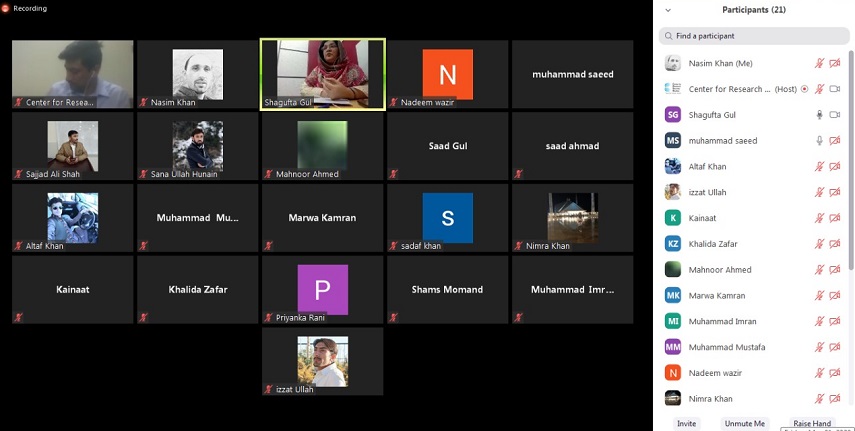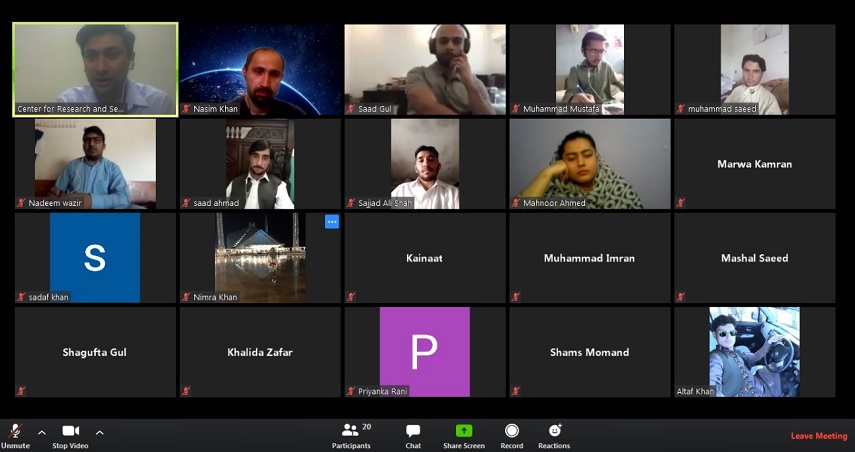The role of youth to tackle COVIC-19 figured prominently during the first round of Ulasi Taroon Online Workshops, organized by the Center for Research and Security Studies (CRSS) on the topic of Social Cohesion in COVID-19 Times and Role of Youth. The workshop was digitally attended by over 20 youth leaders from different public and private sector universities across Khyber Pakhtunkhwa and held as part of the Center’s efforts to continue to cultivate the young through online conduits for communication, in the absence of physical platforms of youth engagement and development.
The participating youth leaders were of the view that COVID-19 needs to be taken much more seriously by the Pakistani society given its devastating human cost. While it is important to avoid panic and stoking public fears, the state should utilize all available forms of media to sensitize the masses on the seriousness of the issue and create public awareness regarding the precautionary measures, as facts, not fear, will stop COVID-19.
We can survive and respond to the social impact of COVID-19 through social cohesion. While we should fight this pandemic with courage and bravery, but not let go of wisdom and much needed precautions. There is a huge onus on the educated members of the society to stop the spread of misinformation and only share/ pass on the factual information as their opinion is valued more in the society and a small negligence on their part can have fatal repercussions.
The youth – even while staying at home – can continue to play their role to tackle COVID-19 by critical observation of the situation, dispelling the misinformation, and defy and report the harmful practices that are jeopardizing the safety of the community at large. The of role of citizenry is at the core of COVID-19 response mechanism; manifest in the fact that only those countries have been able to control the COVID-19 outbreak where the citizens have complied with the governments’ regulations and instructions for public movement and staying home. This cultivates both rule of law and responsible citizenship in the unprecedented testing times.
It is time for the world to rethink its development priorities and military expenditure and already start allocating resources for strengthening health and other sectors of the society which are critical to the overall welfare of the population. This paradigm change should also be reflected in the legislature through a policy making inclusive of the sundry and all needs of the citizens.
Responsible citizenry not only means to educate and aware the society on the fatal effects of novel coronavirus but also lead with inspiring examples of care, precautions, community focused efforts and volunteerism during these testing times.
Ms. Shagufta Khalique, an educationist, noted that challenges must come but they are bound to bring along opportunities too. These opportunities offer the potential avenues of youth participation in the community development and must be harnessed. Every crisis not only needs to be responded immediately but it should also be followed up with the efforts vital to future preparedness.
Given the increasing social and all other forms of (complex) interdependence in the post globalized era, not only we must formulate shared goals of social cohesion and development, but also respond to the local crises responsibly or it can have global consequences. A huge chunk of population around the globe needs awareness and education about the COVID-19 and its precautionary measures, as an attempt to cultivate the role of public in curbing this pandemic. Youth being themselves receptive to the new ideas, can play an effective and influential role during this unprecedented challenge. It is also an opportunity for youth to master their leadership skills in the times their family, community and the country needs them the most. Youth can also serve as a bridge between the communal needs and the relief services on offer, thus practicing responsible citizenship. Youth as critical thinkers should only pass on authentic information; distinguishing between the myths and truths about COVID-19. This is also a precondition for risk communication.
Mr. Malik Mustafa, Team Leader, Ulasi Taroon, noted that we must have different opinions and perceptions based on different backgrounds including but not limited to religion, gender, culture, language, education, experience. Social cohesion demands not only accepting and but also respecting these differences and fostering mutual interactions to get to know each other better. Such a communication is vital to social cohesion as it not only discards the differences but also shifts the focus from differences to commonalities; factors that unite us.
The spirit of social cohesion is equal and responsible citizenship; the preconditions which become much more relevant in the times of COVID-19. We must be cognizant of the collective vulnerability to COVID-19 and thus fathom the collective responsibilities to overcome this crisis. A negligence on the part of an individual can have serious consequences for all since the coronavirus has proven to be indiscriminate in terms of who it infects and where and when that happens. This means an incredible onus to be cautious and keep our near and dear ones safe.
About Ulasi Taroon:
Ulasi Taroon is a counter radicalization initiative of CRSS that aims to address the radicalization challenges and extremist ideologies and foster social cohesion in KP through a discourse anchored in the core constitutional values. The endeavors aim cultivate and sensitize the target groups in these core values highlight the criticality of abiding by these concepts – such as adherence to rule of law, primacy and sanctity of constitution, equal citizenry, respect for fundamental human rights, tolerance for diversity and different opinions, inclusive democracy and good governance – as a measure of fostering social cohesion and peaceful co-existence.


